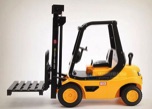
Forklift Training
& Employment America
forkliftnow.com - Your Best Choice For a Career As a Forklift Operator!
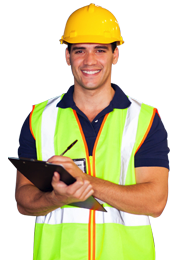
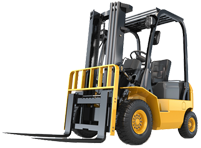
Your Forklift Career...
Starts Here!
To Forklift Training Employment America, where you’ll easily find
all the information and resources you need to start your career
as a forklift operator. Here you’ll find your state or provincial training requirements, information on forklifts and forklift job listings.
And all of this information is FREE to you!
Español
English
Forklift Topics
Popular Articles
Recent Posts
Home • Terms of Use • DMCA Policy • Privacy Policy • Affilliate Disclosure
All content ©2016 forkliftnow.com
Forklift Operator Gear
Not only will you need the proper training to become a forklift operator, but you will also need the proper equipment as well. Although most companies provide this equipment to their employees, you should be aware that as a new hire, you might be asked to provide this equipment yourself on the first day on the job. It is often up to you to provide your own safety boots. Below you’ll find a general range of items you may need on the job:
Workplace Safety Boots/Shoes
This is generally the one basic item you’ll need for any forklift job, indoors or outdoors. Safety boots should be clean and in good/new condition with clean laces. The boot must meet safety standards (with approved safety tag) and feature a steel toe or a composite toe protection. New features
of safety boots also include a durable outsole with resistance to chemicals and offer better grip on wet or slippery/cold surfaces. This may be a lifesaver in an environment such as working in a walk-in freezer.
Be sure to test fit your safety boots to ensure a good fit and comfort for
a long shift of being on your feet and walking around. Other options may include waterproof footwear and insulated boots for winter temperatures. It should also be noted that there are may newer varieties of boots available that are low cut and resemble sport shoes or sneakers.
You should generally steer away from those versions of shoes as most companies insist on footwear that also covers the ankle area.
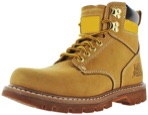
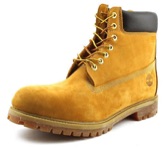

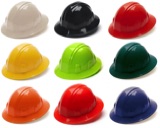




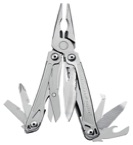

Work Gloves
A good pair of work gloves can certainly help the forklift operator.
As well as providing good grip for the forklift controls, gloves can be useful when handling boxes (paper cuts hurt) or in cold environments such as warehouses/freezers. Look for quality gloves that fit well and
give a good grip. In certain environments, arm length safety gloves may be necessary for handling dangerous chemicals.
Work Socks
This is often an item that gets overlooked in the workplace but a good
pair of work socks can make a big difference in your comfort during the day. Having sore feet can make your job tiresome and dangerous if
you’re distracted. A good tip is to carry an extra pair of dry socks to work incase your feet get wet on the job. This often happens in outdoor work
or one that involves cold/wet environments.
Hard Hat/head protection
Because forklift operators often work in environments such as the construction site or in warehouses, it will be necessary to wear head protection. Look for a hard hat that meets certified safety standards and
is comfortable to wear without impacting visibility. Options can also include summer hats with better ventilation and sun visors for outdoor work. Although hats can now be printed with graphics, it is recommended to stick with simple visible colors.
Safety Glasses/Goggles
Since you will be working in an industrial environment, safety glasses
are usually needed. Although your employer can provide safety glasses,
it may be wise to purchase your own pair, especially if you wear glasses for corrective vision. Some safety glasses don’t fit over your own glasses so you may need to test fit them. In jobs involving chemicals, you may need to wear protective goggles that seal around your face to prevent liquids from getting in your eyes. A face shield may also be an
option here.
Clipboard
A clipboard can be very useful to the forklift operator. Not only does
it provide a flat surface to write on (such as filling out the walk around checklists) but many clipboards feature “portfolio” style cases that can contain a calculator and a pen holder. You job may require you to fill out paperwork throughout the day and carrying a clipboard will make you more professional on the jobsite. Be sure to carry a couple of pens with you as well.
Flashlight
Forklift drivers often load and unload 40’+ trailer trucks, usually with limited light available. Although forklift are provided with headlights,
in some cases you may need to work outside of the forklift to adjust
loads inside the trailer. A small flashlight that can be carried on your
belt or clipboard can be a big help in these situations.
Multi-Tool
Often known as a “leatherman tool” these tools are often useful to the forklift operator when needing to cut rope, package wrap, or make small adjustments to machinery. Be sure to look for a small carrying case with belt attachment that can easily be carried by you. Also be aware that some companies forbid employees from carrying their own tools or
knives in the workplace so be sure to ask first.
Forklift Toys
Although not an essential piece of gear for a forklift operator, many operators of construction equipment often collect toys or models of the machinery they are operating. There are several types of forklift models available from die-cast models to remote control forklifts that operate similar to the real thing. Also, forklift toys make great gifts for your kids!
